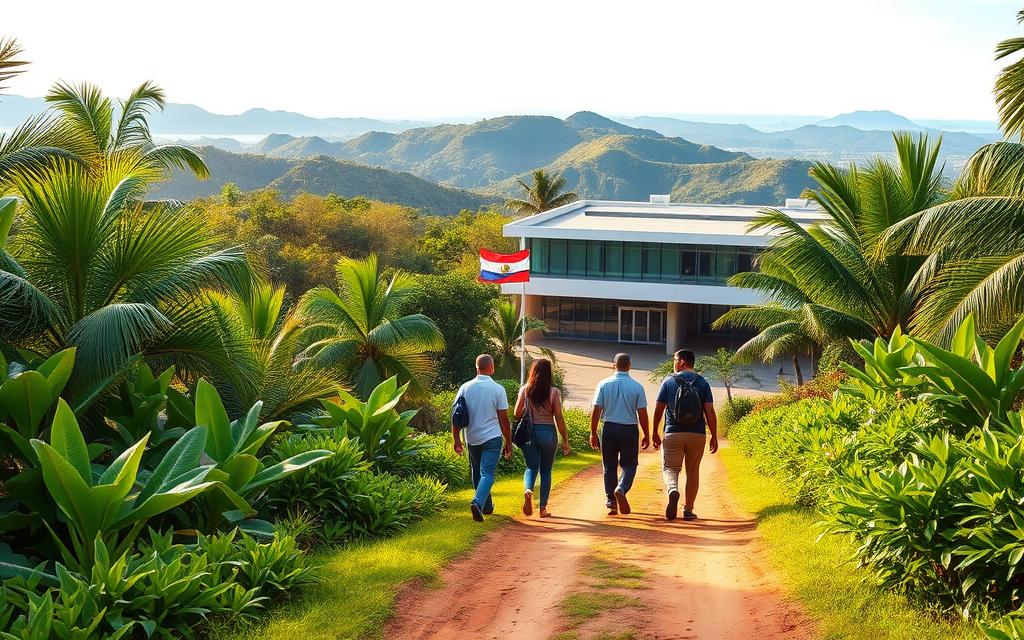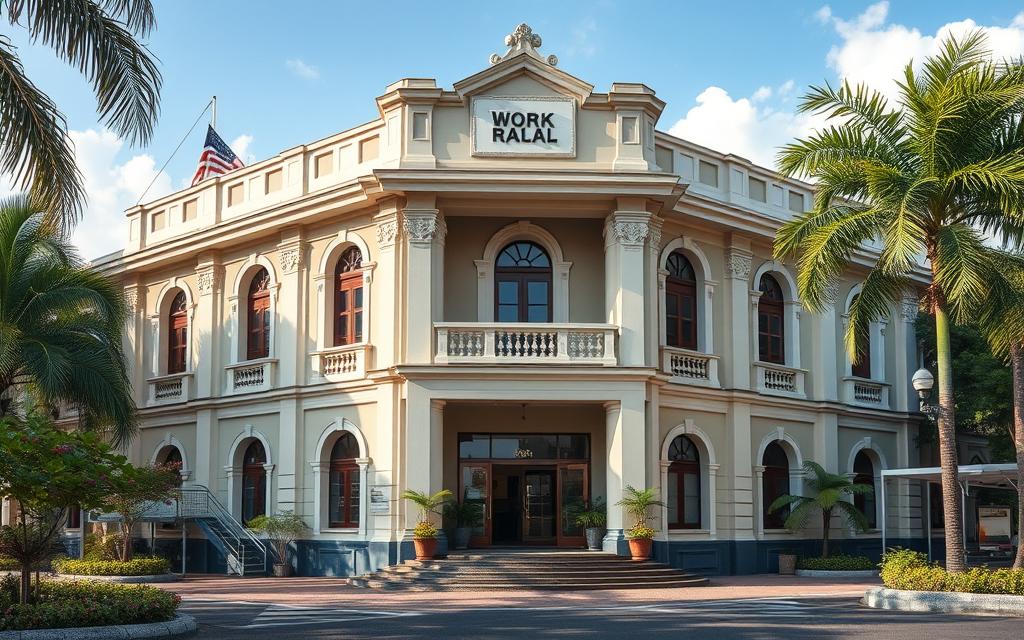Can foreigners work in Costa Rica legally? Our Residency Guide

Costa Rica has emerged as a highly desirable destination for individuals and families seeking a better quality of life. Known for its natural beauty and rich culture, this Central American country offers a unique blend of relaxation and opportunity.
To work in Costa Rica, understanding the country's residency options is crucial. The law prioritizes local employment, but securing a residency status can significantly improve a foreigner's chances of finding a job. Various residency paths, including rentista and investment options, can lead to legal work authorization.
We will explore the complex landscape of working legally in Costa Rica, addressing common challenges and opportunities. Understanding the distinction between living in Costa Rica and having legal permission to work is vital for a smooth transition.
Understanding Costa Rica's Work Regulations for Foreigners

Understanding the intricacies of Costa Rica's work regulations is crucial for foreigners looking to secure employment. Costa Rica has a complex system in place to manage foreign workers, and navigating this system is essential for a successful job search.
Costa Rica's Approach to Foreign Workers
The Costa Rican Ministry of Labor implements protective policies that require employers to demonstrate why a position cannot be filled by a local before hiring a foreigner. This means that finding a job in Costa Rica will require foreigners to prove themselves as highly skilled workers. To make a strong case, having at least a Bachelor's degree is necessary, although a Master's degree is strongly preferred.
Legal Framework for Employment of Non-Citizens
Costa Rica has established specific categories of work permits and residency options that determine who can legally work in the country. To work in Costa Rica, one must understand the distinction between having permission to live in the country versus having legal authorization to work, as these are governed by different regulations. For detailed information on obtaining a work visa, visitingrelevant resourcescan provide valuable insights.
In summary, understanding Costa Rica's work regulations is the first step toward developing a strategy for legally working in the country as a foreigner. By grasping the legal framework and the requirements for foreign workers, individuals can better navigate the job market in Costa Rica.
Can Foreigners Work in Costa Rica Legally?

The question of whether foreigners can work in Costa Rica legally is a complex one, with several factors at play. Costa Rica's labor laws are designed to protect the rights of its citizens while also providing opportunities for foreign workers to contribute to the economy.
General Restrictions and Limitations
Foreigners seeking to work in Costa Rica must navigate a framework that prioritizes local employment. To hire a foreigner, employers must typically demonstrate that the position cannot be filled by a qualified Costa Rican. This involves showing that the foreign worker brings unique skills or expertise not readily available in the local job market.
The concept of "special category work" is crucial here, as it defines the types of jobs that foreigners can legally perform. Special category work includes roles that require specialized skills or knowledge that are in short supply among Costa Rican citizens.
Prioritization of Local Employment
Costa Rica's labor laws are geared towards protecting employment opportunities for its citizens. The country has a robust economy with a growing demand for skilled workers in various sectors. However, there are instances where foreign expertise is necessary, and this is where the special category work permits come into play.
To secure a work permit under the special category, the employer must justify the need for a foreign worker. This involves proving that the foreign worker's skills are essential for the job and that no qualified Costa Rican is available for the position. This approach ensures that while local employment is prioritized, there is still room for foreign workers to contribute to the economy in meaningful ways.
Residency Categories and Work Permissions

Understanding the various residency categories in Costa Rica is crucial for foreigners who wish to work legally in the country. Costa Rica offers a range of residency options, each with its own set of rules and implications for work permissions.
Permanent Residency and Work Rights
Permanent residency in Costa Rica grants individuals the right to live and work in the country with the same freedoms as Costa Rican citizens. Obtaining permanent residency can be challenging and is often achieved through familial ties or after holding temporary residency for a certain number of years. Once granted, permanent residents can work in any capacity without needing additional work permits.
Temporary Residency Options
Temporary residency in Costa Rica comes in several forms, including rentista, inversionista, and pensionado, among others. Each category has its own requirements and implications for work authorization. For instance, rentistas, who are individuals with a guaranteed income from abroad, may need to apply for a work permit if they wish to engage in employment. Understanding the specific requirements of each temporary residency category is essential for foreigners planning to work in Costa Rica.
Special Category Residency
Special category residency is designed for specific professions or situations, such as artists, athletes, technical experts, and corporate transferees. This category allows for streamlined work permissions for individuals who fall under these special categories, facilitating their ability to work in Costa Rica. The requirements for special category residency vary depending on the specific category and the nature of the work to be performed.
By understanding the different residency categories and their associated work permissions, foreigners can better navigate the process of obtaining the necessary permissions to work legally in Costa Rica. Whether through permanent residency, temporary residency, or special category residency, Costa Rica provides pathways for qualified individuals to contribute to its economy and society.
Rentista Residency: Living in Costa Rica with Foreign Income

For individuals looking to live in Costa Rica without working locally, the Rentista residency option is an attractive choice. This category is specifically designed for foreigners who have a stable income from sources outside Costa Rica.
Eligibility and Benefits
To qualify for Rentista residency, applicants must demonstrate a guaranteed monthly income of at least $2,500 from foreign sources for a minimum of two years. This requirement makes the program particularly appealing to remote workers, freelancers, and digital nomads who earn their income from abroad. The benefits of this residency category include the ability to live in Costa Rica without the need to work locally, allowing for a relaxed lifestyle in a beautiful environment. As explained in more detail on our page about work permits vs residency, understanding the nuances between work permits and residency is crucial.
Work Limitations and Considerations
It's essential to understand that Rentista residents cannot legally work for Costa Rican employers or provide services within Costa Rica. However, they can own businesses in Costa Rica and earn profits from these investments, creating an alternative path to income within the country. After maintaining Rentista status for three years, individuals become eligible to apply for permanent residency, which would grant full work rights. This makes the Rentista option a strategic stepping stone for those who ultimately want to work legally in Costa Rica but need time to establish themselves.
Inversionista (Investment) Residency

The Inversionista residency option in Costa Rica is tailored for serious investors looking to establish a presence in the country. This program is particularly appealing as it not only allows investors to live in Costa Rica but also grants them the legal right to work, specifically in connection with their investment.
Investment Requirements and Process
To qualify for Inversionista residency, applicants must invest a minimum of $150,000 in a Costa Rican business or property. This investment can take various forms, including purchasing real estate or investing in a local business. The process involves several steps, including applying for residency and obtaining the necessary permits.
Additional costs are associated with this process, including business incorporation fees that can range from $10,000 to $18,400. Investors must also comply with the requirement to hire Costa Rican nationals, thereby contributing to local employment opportunities.
Business Ownership and Employment Rights
As an Inversionista resident, individuals have the right to own and profit from a business in Costa Rica. This residency category is unique in that it allows for legal employment in the country, directly related to the investment made.
Popular sectors for investment in Costa Rica include medical devices, advanced manufacturing, information technology, and ecotourism. After maintaining Inversionista status for three years, individuals become eligible for permanent residency, which comes with expanded work rights.
Pensionado and Other Residency Options

The Pensionado visa is one of several residency options available to individuals looking to live in Costa Rica. This particular visa category is designed for retirees who receive a pension or retirement income from a government or private institution, offering them a chance to enjoy their retirement in Costa Rica.
Retiree Residency Requirements
To qualify for the Pensionado residency, applicants must meet specific income requirements. The program demands that retirees have a minimum monthly income from their pension or retirement fund. We will explore the detailed requirements and benefits associated with this category, ensuring that potential applicants understand the eligibility criteria and the advantages of choosing the Pensionado visa.
Work Restrictions for Pensionados
While the Pensionado visa offers a pathway to residency, it comes with significant work restrictions. Pensionados are not allowed to be employed by Costa Rican companies or provide services within the country. However, they can own businesses and earn income from investments in Costa Rica, providing an alternative means of financial engagement. We will discuss how these restrictions impact retirees and the potential for future work authorization through permanent residency.
Applying for Work Permits in Costa Rica

The process of applying for a work permit in Costa Rica involves several critical steps that employers and employees must follow. To work legally in Costa Rica, foreigners must obtain a work permit, which requires demonstrating that the position cannot be filled by a qualified Costa Rican citizen.
Required Documentation
To apply for a work permit in Costa Rica, several documents are required. These include a valid passport, birth certificate, marriage certificate (if applicable), police clearance, proof of income, and employer statements. Ensuring that all documentation is complete and accurate is crucial for a smooth application process.
For more information on identification requirements in Costa Rica, you can refer to our guide on Dimex Costa Rica.
Application Process and Timeline
The application process for a work permit involves multiple steps: applying for a provisional visa, registering fingerprints with the Ministry of Public Security, and submitting the work permit application to the Immigration Department. Applicants should be prepared for a lengthy timeline, as processing typically takes three to eight months, sometimes longer.
It's essential to plan ahead and initiate the application process well before the intended start date of employment to avoid delays and complications that could prevent legal work authorization.
Remote Work and Digital Nomad Options
Costa Rica's introduction of a telecommuting residency category has opened up new opportunities for digital nomads worldwide. This relatively new visa option allows foreigners to legally live in Costa Rica while working remotely for companies based outside the country for up to two years.

Telecommuting Residency Category
The telecommuting residency category is specifically designed for remote workers and digital nomads. It represents Costa Rica's recognition of changing global work patterns and its desire to attract location-independent professionals. This visa category has several key benefits, including the ability to live in Costa Rica without the need for a traditional work permit.
Legal Requirements for Remote Workers
To qualify for this visa, applicants must meet specific requirements, including minimum income thresholds and proof of employment or self-employment with foreign entities. Unlike traditional work permits, this option doesn't require proving that a job cannot be done by a Costa Rican, since the work is performed for foreign companies. Remote workers must still comply with Costa Rican tax regulations and insurance requirements.
Costa Rica's digital nomad visa provides a legal pathway for digital professionals to experience living in the country without navigating the more complex traditional work permit process. With its lush landscapes, welcoming culture, and modern infrastructure, Costa Rica is an attractive destination for remote workers looking to combine work and leisure.
Job Opportunities for Foreigners in Costa Rica
Costa Rica is becoming an attractive destination for foreign workers due to its growing economy and diverse job opportunities. The country has seen significant growth in various sectors, making it an ideal location for foreigners seeking employment.
High-Demand Industries and Positions
The information technology sector in Costa Rica is on an upward trajectory, driven by the rising level of education among the population, resulting in a higher demand for tech-savvy employees. San Jose has become a hub for software development, particularly in SaaS (Software as a Service). Other growing sectors include shared services, such as call centers and technical support, where bilingual skills are highly valued. Tourism remains a cornerstone of Costa Rica's economy, creating opportunities in hospitality, tour guiding, and sustainable tourism initiatives. Additionally, Costa Rica's commitment to renewable energy has created demand for specialists in hydroelectric, wind, and solar power technologies. The healthcare and life sciences industry also offers opportunities for qualified medical professionals and researchers.
Finding Employment as a Foreigner
To find employment in Costa Rica, foreigners can utilize job platforms like LinkedIn, Indeed, and specialized expatriate job boards. Understanding which industries have the greatest need for foreign expertise can help focus your job search on positions where employers are more likely to navigate the work permit process. For those seeking legal assistance in navigating Costa Rica's employment laws and work permit applications, experts like Jaros CR can provide valuable guidance.
Practical Considerations for Working in Costa Rica
When considering a job in Costa Rica, there are several practical aspects that foreign workers need to be aware of. Understanding these factors can help ensure a smooth transition to living and working in the country.
Taxation for Foreign Workers
Costa Rica has a progressive income tax system that applies to both residents and non-residents. Generally, residents are taxed on their worldwide income, meaning that income from both Costa Rican and international sources is taxable in Costa Rica. In contrast, non-residents are taxed only on their Costa Rican source income. As a foreign worker, it's essential to understand how your residency status affects your tax obligations. We recommend consulting with a tax professional to ensure compliance with Costa Rican tax laws.
Healthcare and Insurance Requirements
All residents in Costa Rica are required to participate in the Caja Costarricense de Seguro Social (CCSS), the country's public healthcare system. As a foreign worker, you will need to register with the CCSS and contribute to the system. Additionally, many expatriates choose to supplement the public healthcare system with private health insurance. For more information on health insurance options in Costa Rica, you can visit this resource. Understanding your healthcare and insurance requirements is crucial for maintaining your well-being while living in Costa Rica.
By understanding the practical considerations involved in working in Costa Rica, foreign workers can better navigate the challenges and opportunities that come with living and working in this beautiful country.
Conclusion
Ultimately, Costa Rica's diverse residency options make it an attractive destination for expatriates. We've explored the complex question "Can foreigners work in Costa Rica legally?" and provided a comprehensive overview of the pathways to legal work authorization. Costa Rica offers various residency categories, including rentista residency, investment residency, and permanent residency, each with its own requirements and benefits. For personalized assistance with residency applications and work permits, we recommend consulting with immigration specialists, such as those at Jaros CR, who can guide you through the process based on your specific circumstances.


